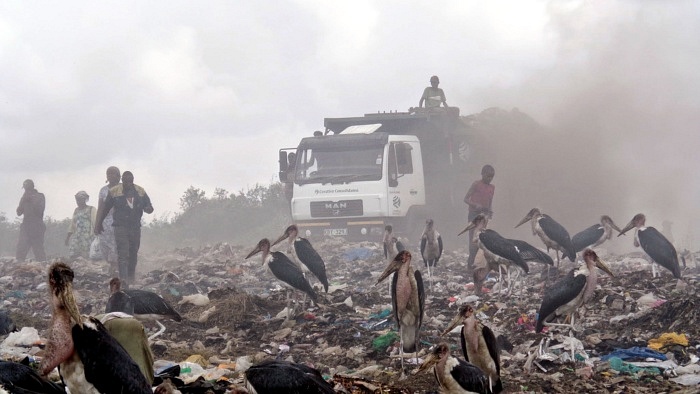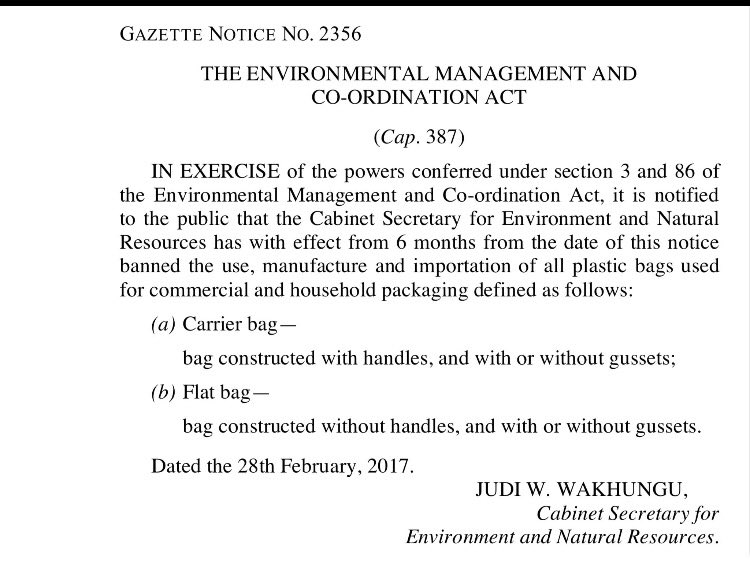Banning Polythene Bags Does Not Fix The Inherent Problem With Carrier Bags In Kenya
Someone once said that a sure way to know you are in a Kenyan’s kitchen, is the sight of the polythene bag that contains other polythene bags. This iconic polythene bag will usually be located in a cupboard under the sink.
This peculiar characteristic will soon be a relic of history, if the ban on domestic use polythene bags is implemented in line with the Gazette Notice that was published on the 15th of March 2017.
While environmentalists are cheering at this victory, I am not as crazy about it.
Look. Polythene bags are a menace. They’re everywhere you look, especially in our town centres. They’re a garbage disposal nightmare and have even been controversially blamed for the perennial flooding of the cities (Nairobi and Mombasa), whenever it rains – may be wrongly so. However, are paper bags the solution? Will banning polythene bags fix the pollution issue?
There are behavioural issues that a ban will not fix but also suggest that in Kenya, polythene > paper
Policy makers seem to think that once they ban plastic, heaps of garbage at places like the Dandora dumping site will magically disappear, and our streets will be free of paper. This is a wrong assumption. We have a garbage disposal problem, not a polythene problem. Kenya is not unique in its use of plastics, but how those plastics are disposed is what makes them an eyesore. In our homes, we mix the plastic in with other types of refuse, and while some of it is recycled, this is done after it is dumped at the various dumping sites. If we switch to paper, that will not change. We will still throw paper willy-nilly, and will still dump the waste at the same places. Key question here is, what can be done, to change the way we dispose our waste?

The Dandora dumping site is said to be so big, that it can be seen from space.
The second behavioural aspect is actually a positive one. We re-use quite a bit of the plastic papers that are currently manufactured. This is why we have that iconic polythene bag that has polythene bags in our homes. Very rarely do we dispose functional polythene bags. They are used to carry other items, to hold garbage and more commonly, in our markets to package bought goods – a shopping trip to Wakulima and other farmers markets will confirm this. If we switch to paper bags, that will no longer be possible. Paper bags are much harder to re-use as they tear easily.
Paper bags are not better for the environment
Environmentalists pushing for the ban of polythene in favor of paper bags seem strangely blind to aspects of paper bag manufacture that are as harmful to the environment as polythene bags, if not worse. Numerous studies have been done and what is common across is that:
- The ultimate source of the paper that is used to make paper bags is trees. Not very environmentally friendly.
- Paper bags are harder to re-use, so per capita, we would need to produce more paper bags than we would polythene bags, for domestic packaging purposes. The Ontario Ministry of the Environment audit data that tracks the province’s 50% bag reduction program shows a 59.1% alternate rate for plastic shopping bags. The 2011 LCA by the UK Environment Agency identified a reuse rate of 40.3%.
- Paper bags consume significantly more energy in production than polythene bags. According to the Scottish government’s 2005 Report on Plastic Shopping Bags, the manufacture of paper bags consumes four times more water than the manufacture of plastic bags and paper generates three times more greenhouse gases.
- On volume, paper bags are more bulky than plastic bags. The typical plastic shopping bag weighs 6-8 grams; a standard paper bag weighs 55 grams. This leads to additional waste, waste management and recycling costs. In Kenya, this just means that our dumping sites just grow bigger and bigger.
This is not to say that polythene is not problematic. Every bag, whether plastic, paper or cloth has an environmental impact in its manufacture, use and ultimate disposal. But looking at the studies and the data out there, there’s not enough justification for banning plastic bags for paper bags, in fact in Europe, companies are reverting to polythene, from paper bags for their packaging.
So what is the solution?
What matters for the environment is not the type of bag used, but how it is used:
- Make bags that are easier to re-use. Increase the size and strength of the polythene bags that are used domestically.
- Encourage behavior change around waste disposal. Someone needs to crack this Kenyan phenomena of throwing refuse everywhere.
- Encourage behavior change in the use of light polythene for packaging as it is not easily recyclable. May be incentivise use of heavier polythene by imposing taxes on the light polythene bags.
- Tax polythene bags to encourage re-use.
- More investment and effort into recycling. Sweden has gotten so good at recycling, that they are now importing waste to recycle. Surely there is something to learn here. For as long as we have huge dumping sites, we cannot really claim to be invested in environmental protection. Polythene ban is a band aid.
For further reading:
This page has links to a number of studies. I like that it discloses who funded the studies.
Carrier bags – material matters. The page quotes a UK government funded study.





1 Comment